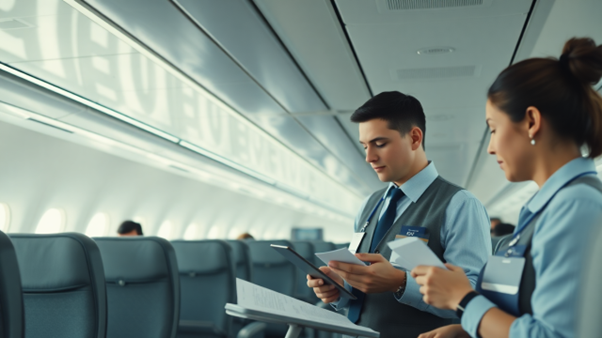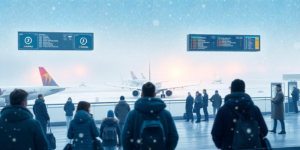Introduction
In the fast-paced airline industry, timely and accurate communication is essential. Passengers expect instant updates on flight schedules, delays, and rebooking options. However, many airlines still rely on outdated, manual communication processes—such as call centers, emails, and in-person inquiries—which significantly impact efficiency and customer satisfaction.
A study by the International Air Transport Association (IATA) found that 20% of airline customer complaints stem from poor communication during disruptions. Moreover, manual workflows can increase airline operational costs by up to 15% annually. A recent study indicates that 70% of travelers express dissatisfaction when not informed of flight modifications in a timely manner, highlighting the critical need for effective communication strategies. This blog explores the challenges posed by manual processes and demonstrates how automation, particularly with VoyagerAid, can enhance productivity and streamline communication.
Table of Contents
Challenges Posed by Manual Processes
Slow Response Times
Manual communication methods are inherently slow. A 2023 industry report shows that airlines take an average of 20-30 minutes per passenger to resolve a rebooking request manually. In contrast, automated solutions can reduce this to under 2 minutes. Additionally, over 30% of passengers report dissatisfaction when their itineraries are altered without proper notification, emphasizing the importance of timely updates during disruptions.
Operational Inefficiencies
Many airline operations teams cite manual processes as a primary cause of inefficiency. Tasks such as manually updating flight records, sending email notifications, and processing special requests consume unnecessary time and resources. Studies suggest that 41% of airline delays in passenger services are due to inefficient manual workflows. Furthermore, a flight departure delay of just 1 minute can cost an airline upwards of $100 USD. For an airline operating 1,000 flights daily with an average delay of 3 minutes, this could result in an estimated cost of around $9 million monthly due to poor communication.
High Staff Workload and Resource Strain
With manual processes, staff spend a large portion of their time handling repetitive queries. A leading airline reported that 40% of its customer service staff’s time is spent answering basic queries that could be automated. This increases workload, leading to higher stress levels, reduced efficiency, and staff burnout.
Increased Risk of Errors and Miscommunication
Human error is a major risk in manual processes. A 2022 airline study found that 35% of passenger complaints are due to miscommunication, such as incorrect flight updates or lost rebooking requests. These mistakes can lead to unnecessary compensation costs and damage an airline’s reputation.
Impact on Costs and Resources
Higher Operational Costs
Airlines spend a significant amount on manual processes. For instance, the average cost of handling a manual rebooking request is $30, while an automated system can process the same request for under $5. Given that some airlines handle over 500,000 rebookings annually, this translates to millions in unnecessary costs. Additionally, airlines utilizing automated communication systems have reported a 30% reduction in communication-related complaints, demonstrating the effectiveness of automation in improving operational efficiency.
Strain on Staff Resources
Handling thousands of passenger queries manually requires a large workforce. According to industry data, 30% of airline frontline staff report stress due to handling repetitive tasks, impacting overall productivity. Automating these processes allows staff to focus on high-value tasks, such as handling VIP customers and managing critical disruptions.
Passenger Prioritization Challenges
Rebooking and Accommodation Challenges
During flight disruptions, passengers expect quick rebooking and accommodation assistance. However, airlines using manual processes often struggle to manage these effectively. VoyagerAid’s automated communication system can handle up to 95% of rebooking queries, ensuring passengers receive timely updates and alternative travel options without waiting in long queues.
Inability to Prioritize High-Value Passengers Effectively
Frequent flyers and premium passengers expect priority handling, but manual processes make it difficult to identify and assist them promptly. VoyagerAid’s passenger management feature enables airlines to track and prioritize high-value passengers, ensuring they receive immediate assistance and a superior travel experience.
The Role of Automation with VoyagerAid
Streamlining Communication
VoyagerAid’s automation tools enable airlines to send real-time updates via SMS, email, and mobile apps, keeping passengers informed about flight changes, cancellations, and gate updates. This reduces passenger uncertainty and decreases dependency on call centers. Approximately 65% of passengers prefer digital channels for updates, indicating a significant shift towards technology-oriented communication methods that airlines should leverage.
Reducing Workload and Errors
By automating routine tasks like rebookings and notifications, VoyagerAid minimizes the need for human intervention, reducing errors and improving operational efficiency. Improving
Operational Efficiency and Resource Allocation
With VoyagerAid, airlines can allocate resources more effectively. By automating passenger interactions, staff can focus on resolving complex issues rather than answering repetitive queries. This enhances overall efficiency and reduces staffing costs.
Enhancing Passenger Experience through Timely Updates
VoyagerAid ensures that passengers receive instant updates during disruptions, reducing frustration and improving satisfaction. Automated messages about rebooking options, refund policies, and alternate flights empower passengers with timely information, strengthening their trust in the airline. Airlines that excel in timely notifications see a 20% increase in repeat customers, underscoring the long-term benefits of effective outreach and customer engagement.
Conclusion
Manual communication processes create inefficiencies, increase costs, and negatively impact passenger satisfaction. From slow response times to high operational expenses, airlines face significant challenges when relying on outdated methods.
Automation is the key to overcoming these issues. By leveraging VoyagerAid’s smart communication solutions, airlines can enhance productivity, reduce costs, and deliver a seamless passenger experience. The future of airline communication lies in automation—it’s time for airlines to embrace the change.
Want to see VoyagerAid in action? Contact us today for a demo and discover how automation can transform your airline’s communication processes.






